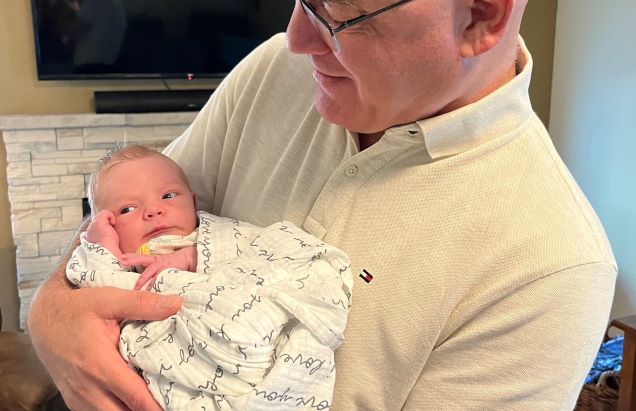
26 Jul My Baby Grandson’s America
This post is going to be different from all but one other to date, in that it will be written in the first person. That is because, as when I wrote about my dad at the time of his death, today’s post hits very close to home.
This time, however, on the other end of the spectrum from My Father’s Politics (September 28, 2021), today’s post is inspired by the exciting news that our first grandchild, a boy, was born this month to our older daughter and son-in-law here in the Twin Cities!
This event, naturally, has led me to think about the world and country this young fellow has entered. Those of you who read my recent thoughts in A 2022 Summer of Love? Not So Far know my concerns about the present times. In these circumstances, will my grandson have a chance for a better life than me (born at the end of the 1950s)? How about better than his parents, who came along circa the early 1990s?
He was Born in the U.S.A.
In 1984, Bruce Springsteen released an album and single he wrote while the country was going through another difficult time—a recession. “Born in the U.S.A.” sold 30 million copies in its first 30 years, spawning a music genre known as “Heartland rock.” The two main things that made Springsteen’s song so famous and enduring, were the catchy title/refrain and the sense of pride the chorus evoked. Hearts swelling, people loved to belt out the simple words “Born in the U.S.A; I was borrrrnnnn in the U.S.A.; I was borrrrrrrnnnnnn in the U.S.A.; Borrrrrrrrrnnnnnnnnnn in the U.S.A.” That was all there was to it, and these elongated words (at least three beats for every born) were more than sufficient to carry the song.
My grandson was born into the same U.S.A. of which Springsteen rocked, even into its same heartland. But what can we as a country do to restore the pride that chorus originally expressed?
Here is one way I think we could look at the questions of a better life and restored pride: This baby boy, God willing, will grow into adulthood and be able to vote for the first time already in 2040. That gives us 18 years to straighten out the mess we have made of American politics.
There will be a presidential election in 2040. Accordingly, I am going to renew my efforts to help the country have solid, principled candidates on future ballots. I want my grandson to have options superior to those my wife and I have seen in our last elections—better than the baby’s own parents ever have had.
Obviously, 18 years from now we will have a new generation of presidential candidates. Gone will be Biden, Trump, the Bushes, the Clintons, Sanders, Warren, and Pence.*
*Although Mike Pence will “only” be 81 years old in November 2040, maybe by then we can get back to non-octogenarian presidents.
Starting now, let us look for candidates for which our new young fella can proudly fill in their oval, punch out their chad, click or tap on their name, or otherwise vote in whatever way voting is done by then. We can set that up by nominating and electing principled, emerging women and men in the 2022 congressional, senate, and gubernatorial races. These new leaders then can learn and grow, developing into excellent candidates for the parties to nominate at the top of the 2040 ticket.
Do it for my grandson, please.
God is in Control
As I think about this baby, I can only imagine what America will witness before he first can vote. Take my own father as an example. He was born on a rural Iowa farm one year before the 1929 crash. Between then and the first time Dad could vote in 1946, America endured the Great Depression (1929-1941), Dust Bowl (1930-36), and WWII (1939-1945).
Despite the adversity America faced during his early years, the words I used ten months ago to introduce the post about my father were these: “A great life in a great country.” That was true.
With faith that God is in control and has a plan, I pray the same can be said when my grandson’s life has come full circle.
Written by Quentin R. Wittrock, founder of Principle Based Politics.
Look for his posts each week, as this blog will explore and promote the idea of principle in politics, both as to individual elected leaders and our federal government as an institution.


No Comments